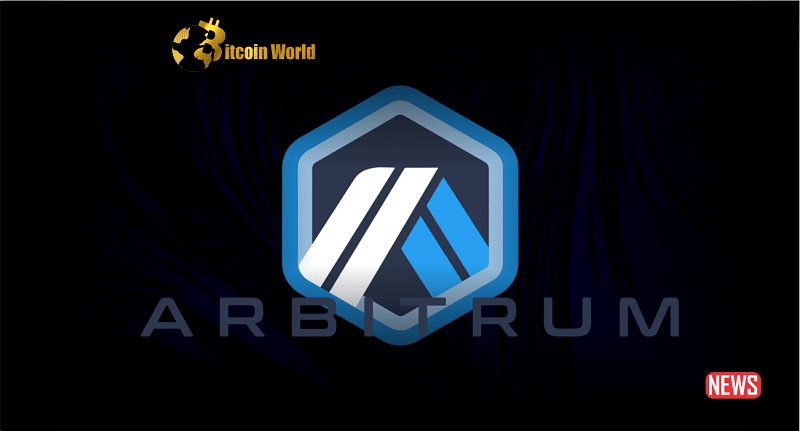The world of decentralized autonomous organizations (DAOs) is often touted as the future of governance, promising transparency and community-driven decision-making. But as recent events within the Arbitrum ecosystem show, the path to true decentralization isn’t always smooth. Remember the buzz around the planned transfer of 700 million ARB governance tokens? Well, it didn’t exactly go as planned, sparking a crucial conversation about communication and governance in the decentralized space.
What Exactly Happened with the ARB Tokens?
Let’s rewind a bit. Back in early April, a proposal was put forward to transfer a significant chunk of ARB tokens – roughly $1 billion worth – to fund the Arbitrum Foundation. However, the DAO, the very heart of Arbitrum’s decentralized governance, decided to pump the brakes. They effectively voted to halt the transfer, leading to the proposal’s retraction. This action ignited a debate about the very nature of DAOs and whether they can truly live up to the promise of decentralization.
Stephen Goldfeder, co-founder of Arbitrum and CEO of Offchain Labs, didn’t shy away from addressing the issue at CoinDesk’s Consensus conference. He admitted, quite frankly, that the communication leading up to the vote was “less than ideal.” In his words, “There was an unfortunate miscommunication, and it was a mistake. If you look back with hindsight, it’s obvious, but at the time, it wasn’t.” It seems the initial framing of the proposal as a mere “ratification” rather than a more involved consultation didn’t sit well with the community.
The “Ratification” vs. Consultation Conundrum
This highlights a key challenge in DAO governance: how to effectively communicate and engage the community in significant decisions. Was it a simple oversight in terminology, or did it reflect a deeper misunderstanding of the community’s expectations? The difference between presenting something for ratification (implying a formality) and seeking genuine consultation (inviting feedback and discussion) is significant, especially in a decentralized environment where community buy-in is paramount.
A Silver Lining? Community Power in Action
Despite the initial missteps, Goldfeder sees a positive outcome. He emphasized the strength of the Arbitrum DAO, stating, “The DAO is the most decentralized DAO that exists.” He even believes the entire incident ultimately strengthened the community’s position. Think about it – the community actively challenged a proposal, exercised its voting power, and influenced the outcome. That’s the essence of a functioning DAO, isn’t it?
Here’s a breakdown of the key takeaways:
- Community Engagement is Crucial: DAOs thrive on active participation. Clear and open communication is non-negotiable.
- Words Matter: The language used in proposals and discussions can significantly impact community perception and engagement.
- DAOs are Evolving: This incident serves as a learning experience, highlighting the ongoing development of best practices in DAO governance.
- Decentralization in Action: The community’s ability to challenge and alter a significant proposal demonstrates the power of decentralized decision-making.
The Harder Part: Building a Thriving Community
Goldfeder also touched upon a fundamental truth: building a strong community is often more challenging than developing the underlying technology. “We are capable of creating technology,” he noted, “But there’s also the issue of creating a community and finding people who are actually interested in it.”
Consider these aspects of community building within a DAO:
- Diverse Interests: A healthy DAO encompasses a wide range of participants with varying goals and perspectives.
- Active Participation: Encouraging members to voice opinions, cast votes, and engage in discussions is vital.
- Shared Ownership: Community members need to feel a sense of ownership and responsibility for the DAO’s direction.
As Goldfeder aptly put it, “All the technology in the world won’t matter if nobody wants to participate, voice an opinion, cast a vote, argue, or engage in a discussion.” The recent events within the Arbitrum community, while initially stemming from miscommunication, ultimately fostered exactly that – discussion and engagement. And that, in the long run, is a positive sign for the project’s health and future.
Looking Ahead: Lessons Learned and the Future of Arbitrum Governance
So, what are the actionable insights we can glean from this episode? For Arbitrum and other DAOs, it underscores the importance of:
- Prioritizing Clear Communication Strategies: Establishing transparent and accessible channels for information dissemination and feedback.
- Fostering a Culture of Open Dialogue: Encouraging healthy debate and diverse perspectives within the community.
- Iterative Governance Processes: Continuously refining governance mechanisms based on community feedback and experiences.
While the road to full decentralization may have its bumps, the Arbitrum experience highlights the resilience and adaptability of the DAO model. The ability of the community to voice its concerns and influence the outcome demonstrates the inherent power of decentralized governance. The “miscommunication” might have been a setback, but it ultimately served as a valuable lesson, potentially forging a stronger and more engaged Arbitrum community in the long run.
Disclaimer: The information provided is not trading advice, Bitcoinworld.co.in holds no liability for any investments made based on the information provided on this page. We strongly recommend independent research and/or consultation with a qualified professional before making any investment decisions.




